Farmyard Hullabaloo
It has been a fun-filled farm themed week!
We have continued our learning on our topic Life on Earth, by exploring animals that may live and work on a farm.
We began our week by reading Farmyard Hullabaloo.
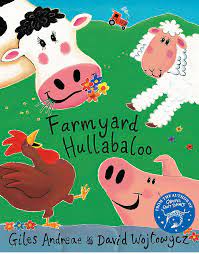
Farmer Time
We had a very exciting video call with a farmer named Luke. The children were very eager to find out about Luke, his animals, and life on a farm.
On the call, we learnt about Farmer Luke’s farm and what types of jobs he does. We even got to join him on a drive to see his neighbour’s cows!
The children confidently asked their questions and listened carefully to his answers.
What is it like being a farmer? Charlotte
What jobs do you do? Sienna
How loud are you animals? Liezah
How do you plant seeds? Norah
What tractor do you have? Albert


Butterflies
Everyone was very excited to see the newly hatched butterflies on Monday morning. The children enjoyed observing them closely and looking at the details on their wings and bodies.
By the afternoon, it was time to release them outside. It was wonderful to watch them fly around our wildflower garden and some children also had the opportunity to hold them.

Poetry Picnic
Each week we will be learning a new poem. We will recite this poem each day. By saying the poem out loud, we can focus on the sounds and rhythm of each word or line. We talk to the children about how this can help us become better readers. This week’s poem is called The Fox.

Phonics
This week we have focused on reading root words with the suffix ing, ed and est.
plumpest swimming melted helped
We’ve learnt the tricky words; out and today.
Help at home- Please continue to work through the weekly learn at home phonics sheets. We’ll continue to send these home each Friday.
Reminders
Sun cream – Please remember to bring in a labelled sun cream, ready for those hot spring days. As your child will need to independently apply their sunscreen, please practise this at home.
Thursday 23 May – Farmyard Festival: (Letter sent home) Please don’t go to the expense of buying anything new – creative adaptations of something you’ve already got will be fantastic. Outfits need to be suitable for school, safe and warm/cool enough to be worn all day.
Friday 24 May- School Closed: Training Day
SWIMMING DATES- Summer 1
Sunshine– 22 May
Rumble in the Jungle
The sun is shining and it has been just wonderful to feel like it’s finally Spring time! Here’s what we’ve been doing in our ‘Life on Earth’ topic this week…
Rumble in the Jungle
This week, our focus book has been Rumble in the Jungle by Giles Andreae and David Wojtowycz.

The book is a collection of fun animal poems. Whilst reading, the children enjoyed listening for rhyming words and noticing the patterns made with the words.

Our word of the week is Rainforest. We’ve been learning all about geographical features of rainforests and about some of the animals who live there.
In our writing, we’ve been remembering facts about rainforests. Lots of children are challenging themselves to write more- check out these amazing double-sided writing examples!
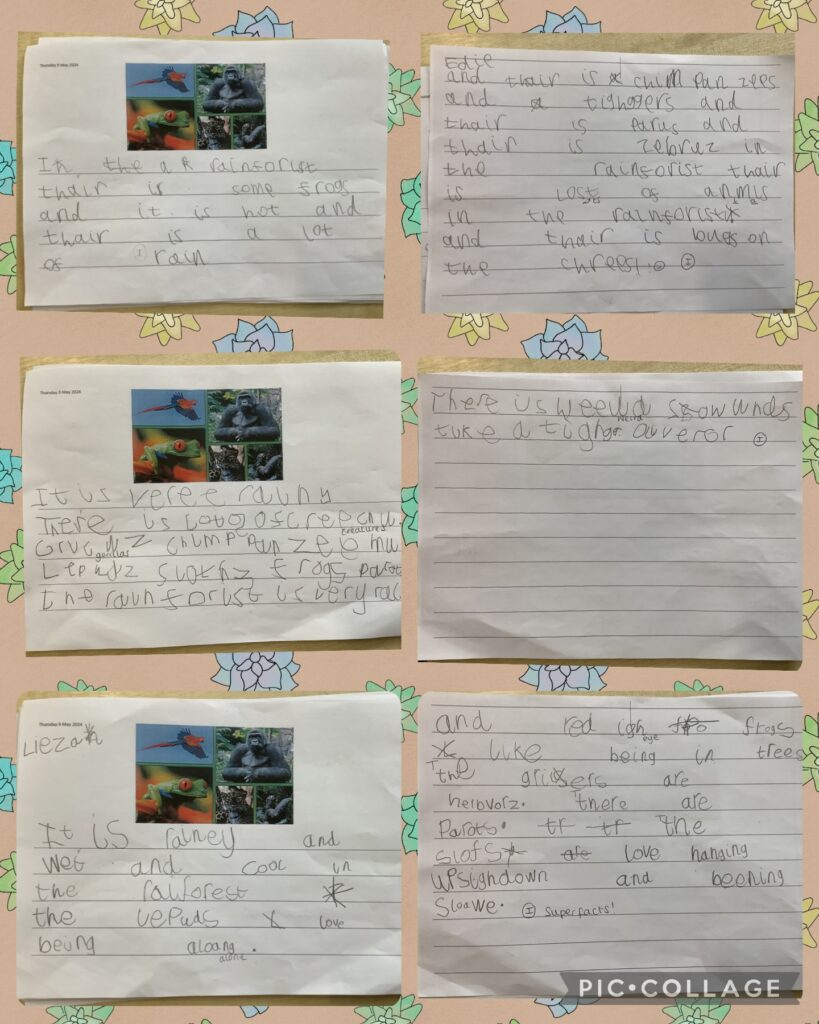
Maths
In maths this week, we’ve continued to develop our understanding of the composition of numbers to 10. Using the rhyme ’10 Fat Sausages’, we have found different ways to represent 10.
We have also used 10 frames and dice patterns to show ‘5 and a bit’ numbers to 10.

Help at home
Use the language – First, then and now to create a number story to match the picture.

Phonics
This week we have continued to read longer words as well as compound words such as windmill, handstand and lunchbox.
We’ve learnt the tricky words; there, when, what, one.
Help at home- Please continue to work through the weekly learn at home phonics sheets. We’ll continue to send these home each Friday.
Living and Learning- I know the importance of ‘five a day‘
Following on from our discussions about healthy balanced diets, we’ve been talking about the importance of getting your ‘five a day’.
The children spoke about why we should eat fruit and vegetables and what that might look like.
It keeps us healthy- Heidi
It makes us strong- Rupert
You should eat a rainbow- Albie S

Poetry Picnic
Each week we will be learning a new poem. We will recite this poem each day. By saying the poem out loud, we can focus on the sounds and rhythm of each word or line. We talk to the children about how this can help us become better readers. This week’s poem is called A Little Shell.

More learning from this week…


Getting ready for year one
We are now over half way through Summer 1 and starting to think about transition into year one. To get the children prepared, we’d like parents/carers to encourage children to come into school through their classroom door independently and wave them off at the waving window. We know there are a few children already doing this, which is great for developing that independence.
We will be asking that after the May half term break, all children come in independently.
Having said this, please know that our door will continue to be open to you for chats and if your child wants to show you their learning.
Thank you for your support.
Reminders and Dates
Thursday 23 May – Farmyard Festival: (Letter sent home) Please don’t go to the expense of buying anything new – creative adaptations of something you’ve already got will be fantastic. Outfits need to be suitable for school, safe and warm/cool enough to be worn all day.
Friday 24 May- School Closed: Training Day
SWIMMING DATES- Summer 1
Rainbow- 15 May
Sunshine– 22 May
Walking through the jungle
This week our focus book has been Walking through the jungle by Julie Lacome.
This repeating story has been great for retelling from start to finish. We recalled the ‘action words’ used throughout the story: walking, running, leaping, swinging, creeping and wading.
First, we drew a story map to re-tell the story. Then, we used our story telling actions below to re-tell the story.
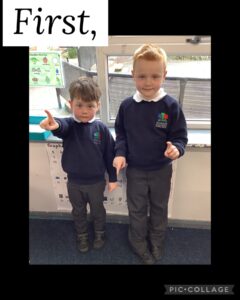

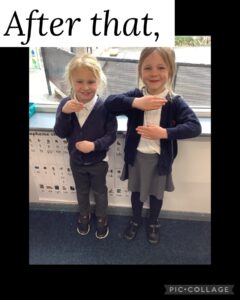
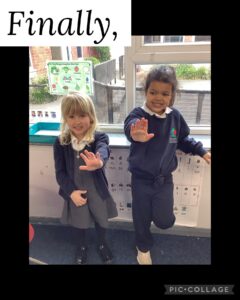
Finally, we re-tolled the story.
Every week, we introduce new vocabulary using the focus book. This week, our ‘word of the week’ is leaping – to jump quickly or suddenly a long way.
“The lion is leaping in the hot, sunny jungle” Albie said.
Design and Technology; using a tool
This week, we have been making a ‘bug hotel’. We’ve been carefully using hand drills to create holes, holding the tool firmly in place and using our strength to wind the handle.

Maths; composing 5
In Maths, we’ve been composing 5 and using the song ‘5 little kittens to explore the parts that make the whole number.

We’ve been using full sentences to explain what we can see on our fingers, as we move through the song:
“There are three kittens on the bed, there are two kittens that have bumped their head, there are five kittens altogether”
“There will always be 5 because we started with 5. We haven’t added any more” Harry said.
We’ve represented our parts on a Hungarian frame (or ‘die frame’):

Help at home– Collect 5 objects. Place some of the 5 objects in front of you and some hidden behind your back. Ask your child how many are hidden. Swap and take it in turns to be the person hiding the objects!
Your child is familiar with this game as we have played it in school. Encourage your child to explain why they know how many are hidden.
“3 are hidden because I know 2 and 3 makes 5. 5 is made of 2 and 3.”
Encourage your child to repeat the below phrases.
5 is made of ____ and ____.
____ and ____ make 5.
Please email us a quote from your child or a photo when playing the game. You’re child will get an extra star challenge on their challenge chart!


Phonics
Summer 1 week 3 has focused on phase 4 words with short vowels and longer words. We’ve learnt the tricky words; were, here, little, says
Help at home- Please continue to work through the weekly learn at home phonics sheets. We’ll continue to send these home each Friday.
Poetry Picnic
One week in every half term, we focus on a traditional nursery rhyme. This week we’ve been reciting Sing a song of sixpence.

Reminders and Dates
SWIMMING DATES- Summer 1
Rainbow Class- 15 May
Sunshine Class- 8 May, 22 May
The Very Hungry Caterpillar
This week, we have been reading The Very Hungry Caterpillar. As a class, we created a story map to help retell the story. We used time connectives to develop our story language.
First, Next, After that, Finally, ![The Very Hungry Caterpillar [Board Book]: Eric Carle : Carle, Eric, Carle, Eric: Amazon.co.uk: Books](https://m.media-amazon.com/images/I/81seu48cujS.jpg)

In our writing, we have been composing sentences to retell main events of the story. Some children chose to adapt the story by changing the main character and food.

The reading challenge this week was to create a story map.

Maths
This week, we have continued to develop our subitising skills (see the quantity without counting) in complex arrangements.
We have explored creating arrangements of 6. The children explained how they could see 6.


Phonics
This week, we have continued to learn phase 4 words such as frog, shift, chimp and drum.
We’ve also learnt more phase 4 tricky words; some, come, love and do
Help at home- Please continue to work through the weekly learn at home phonics sheets, throughout the Summer term. We’ll continue to send these home each Friday.
Poetry Picnic
Each week we will be learning a new poem. We will recite this poem each day. By saying the poem out loud, we can focus on the sounds and rhythm of each word or line. We talk to the children about how this can help us become better readers. This week’s poem is called Under a Stone. Watch here.

Living and Learning
I know the importance of sleep.
The children thought about different reasons we need sleep and how to get a good night’s sleep.
It can sometimes make your eyes sting. (screens)
It wont help her brain. If she’s distracted she wont go to sleep. (iPad)
You shouldn’t have any screen one hour before bed.
If you put a calming song on your might go to sleep.
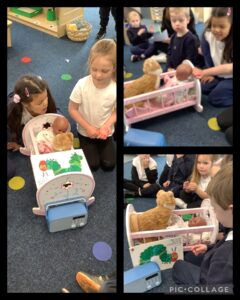
Science
The children have been amazed at the rapid growth of the caterpillars. Each day, we have observed how they have changed and recorded what we noticed

They are massive now!
They have got too big for their skin.
They are moulting.
Reminders and Dates
SWIMMING DATES- Summer 1
Rainbow Class- 1 May, 15 May
Sunshine Class- 8 May, 22 May
The Bad-Tempered Ladybird
We’re excited to be back together for a happy and healthy Summer term!
This half term is called Life on Earth. We’ll be exploring minibeasts, wild animals, farm animals and the human body.
The Bad-Tempered Ladybird
This week, we’ve been reading The Bad-Tempered Ladybird by Eric Carle.
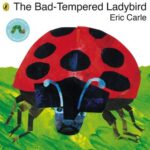
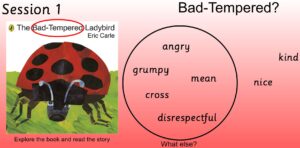
There was lots to explore in this story; feelings and appropriate behaviours, clocks/time and the comparative sizes of animals.
Frustrated is our ‘word of the week’.
In our writing, we’ve written things that make us feel happy and things that might make us feel sad or angry, like that bad-tempered ladybird!
Art; clay modelling
We’ve been using clay to make minibeasts. We looked at pictures and photos of minibeasts, before making our models. We had spiky caterpillars, wiggly worms and crawly spiders to name just a few! Clay is great for our fine motor skills. We have to work hard to mould, pull, press and shape. We’ll be continuing with our clay creations into next week.

Maths
In Maths, we’ve been counting beyond ten- to twenty. We’ve been suggesting ways to make counting easier, when we are faced with a lot of objects to count.
We’ve also been counting things that cannot be moved, or things that cannot be seen (such as sounds/actions)
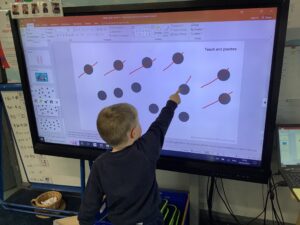
In provision, we explored doubles through doubling ladybirds and recorded our findings.
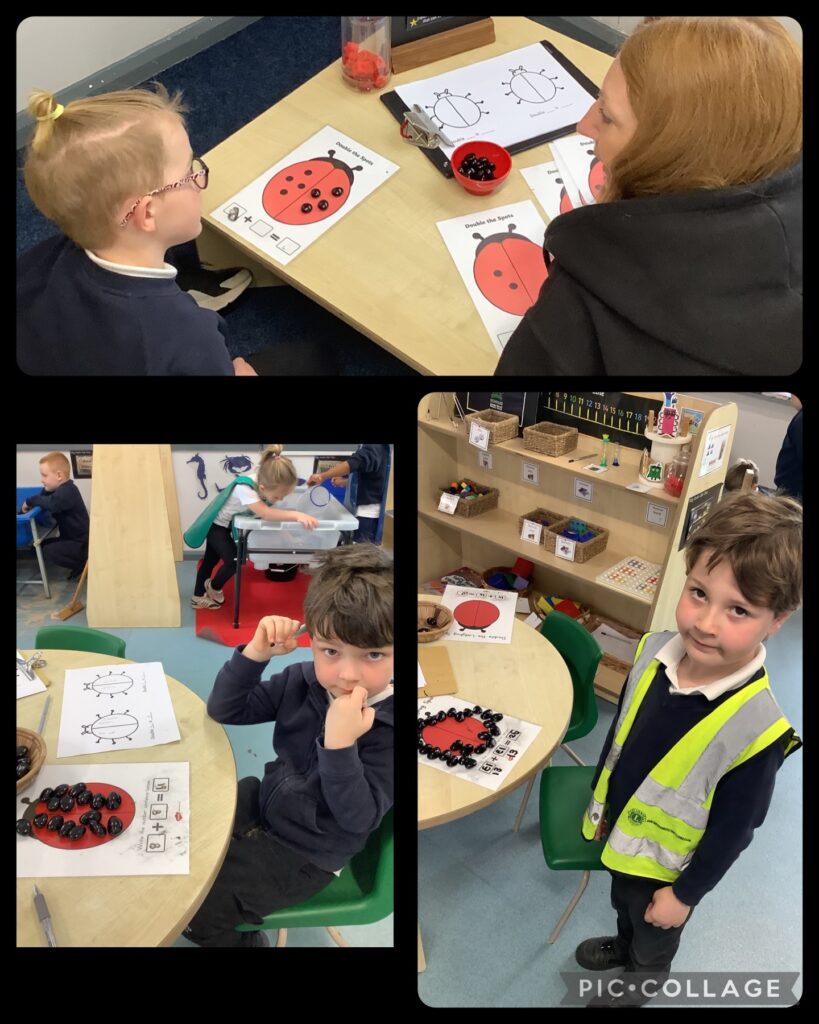
Help at home- Challenge your child to count more than ten objects. Can they count the pegs on the washing line? Can they count toys in their toy box? Can they count books on a book shelf? Don’t forget to send in photos of counting at home!
Caterpillars
We’ve got some new additions to the classroom, as this week some very tiny caterpillar friends arrived! We’ve been observing them and have been writing about the caterpillar life cycle. Some of us also wrote down how we will keep them safe. We can’t wait to see them change and grow over the next few weeks.

Phonics
Summer 1 week 1 has been an introduction to reading phase 4 words. We’ve also learnt our first phase 4 tricky words; said, so, have, like
Help at home- Please continue to work through the weekly learn at home phonics sheets, throughout the Summer term. We’ll continue to send these home each Friday.

Poetry Picnic
Each week we will be learning a new poem. We will recite this poem each day. By saying the poem out loud, we can focus on the sounds and rhythm of each word or line. We talk to the children about how this can help us become better readers. This week’s poem is called Pitter Patter
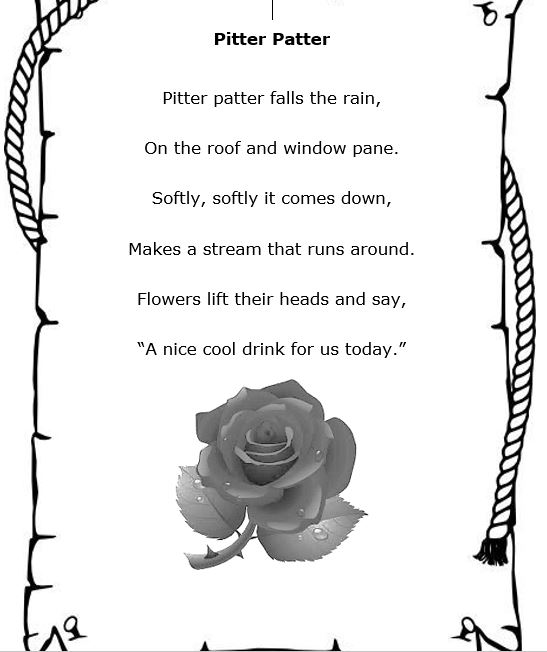
We talk about how a poem sometimes has rhyming words and sometimes doesn’t. Can your child tell you the rhyming words in this week’s poem? We also talk about how a poem can have a fast rhythm or a slow rhythm.
click below to watch us recite this week’s poem!
More pictures of our learning this week…


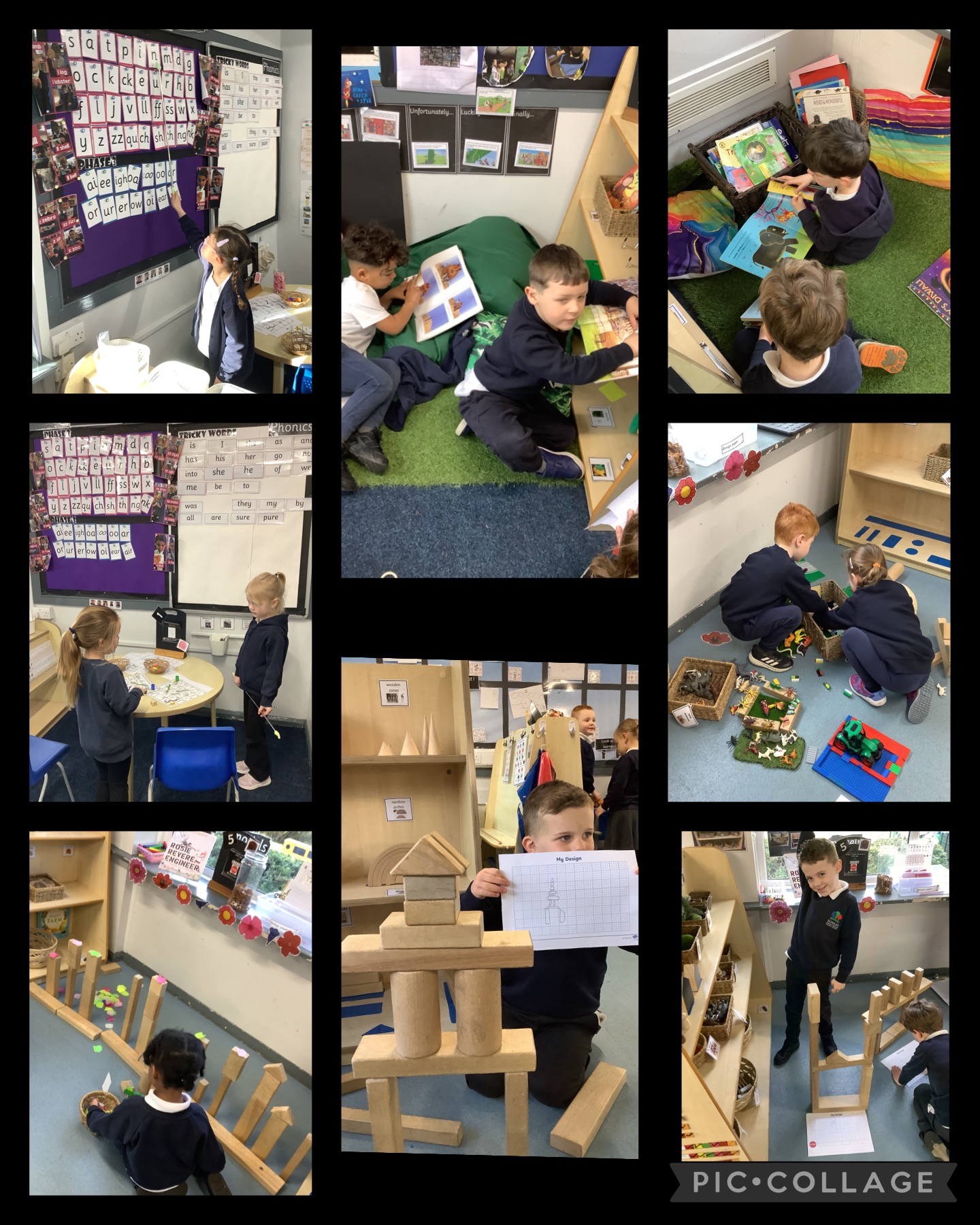
Reminders and Dates
SWIMMING DATES- Summer 1
Rainbow Class- 1 May, 15 May
Sunshine Class- 24 Apr, 8 May, 22 May
Rabbits don’t lay eggs!
Rabbits Don’t Lay Eggs
This week, we’ve been reading Rabbits Don’t Lay Eggs by Paula Metcalf.

Top tip for watching YouTube with your child: go to the settings cog along the play bar and turn off auto play – this avoids an inappropriate clip coming up automatically, and helps to discourage your child from passively watching clip after clip.
The story begins on a farm, with a rabbit named Rupert. All he wants is to be useful but unfortunately, he struggles to find anything he’s good at. Luckily, he soon finds an unexpected job on the farm.
Our ‘word of the week’ is creation – something that is made or created.
“Come look at my creation!”
“The creation of new life, like lambs.”
We also spotted some other adventurous words in the story.
Giggled to laugh lightly and repeatedly (a lot) in a silly way.
“When I told a knock-knock joke. Finlay giggled!” said Rupert.
Glumly to look unhappy and disappointed.
We also talked about writing the story from the farmers perspective. How would he feel waking up to no vegetables? To seeing Rupert running across his field? The children wrote some fantastic stories!
Maths
In Maths, we have been sorting objects by attributes.
They are sorted by colour.
They’re big and they’re small.
Those bears have scarves and they don’t.

Poetry Picnic
Each week we will be learning a new poem. We will recite this poem each day. By saying the poem out loud, we can focus on the sounds and rhythm of each word or line. We talk to the children about how this can help us become better readers. This week’s poem is called A Tiny Seed.

We talk about how a poem sometimes has rhyming words and sometimes doesn’t. Can your child tell you the rhyming words in this week’s poem? We also talk about how a poem can have a fast rhythm or a slow rhythm.
We always look at two words in the poem and share the definition. This week, we looked at the following words.
sow – plant (seed) by scattering or putting in soil
shower – a short period (time) of rain
We finished the week with lots of Easter themed activities. The egg rolling competition was a real highlight of the day!


Home learning
Can you write a daily diary about your half term? A sentence a day would be fantastic! Please bring your diary in to share when we return to school.
Writing reminder
Remember, it is okay for things to be spelt phonetically. It is important your child grows into an independent learner. Encouraging your child to write the words as they sound rather than always spelling correctly is important. It encourages your child to use their own skills – rather than copy from an adult.
It is important you do not let your child simply copy your writing. They need to use their phonics skills to write. Here is an example of a child’s writing in Reception.

Have a fantastic half term!
Reminders and Dates
SWIMMING DATES- Summer 1
Rainbow Class- 17 April, 1 May, 15 May
Sunshine Class- 24 April, 8 May, 22 May
A Tiny Seed
This week, we’ve been reading The Tiny Seed by Eric Carle.
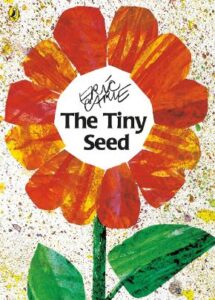 Some of the children recognised the illustrations, knowing that the author also wrote The Very Hungry Caterpillar.
Some of the children recognised the illustrations, knowing that the author also wrote The Very Hungry Caterpillar.
The story follows the journey of a tiny seed, tracking its journey through the four seasons.
We decided to go on a season walk to find signs of spring. The children spotted buds, leaves, blossom, bees and even the sun.

Miniscule is our ‘word of the week’. We’ve been learning that miniscule is even smaller than tiny!
Maths
In Maths, we’ve been doubling! Ask your child explain how we find doubles.


Phonics
Spring 2 week 5 has been a review of phase 3 sounds. We’ve been reading longer words, words with s in the middle /z/ (like ‘visit’), words ending –s and words with –es at end /z/ (like ‘foxes’)
Poetry Picnic
Each week we will be learning a new poem. We will recite this poem each day. By saying the poem out loud, we can focus on the sounds and rhythm of each word or line. We talk to the children about how this can help us become better readers. This week’s poem is called Hungry Birdies.
We talk about how a poem sometimes has rhyming words and sometimes doesn’t. Can your child tell you the rhyming words in this week’s poem? We also talk about how a poem can have a fast rhythm or a slow rhythm.
click here to watch us recite this week’s poem!
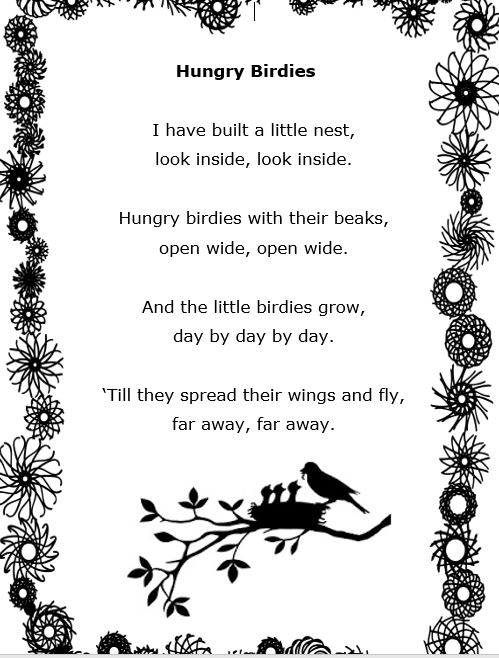
Road safety
A visitor came to talk to us about how to keep safe around roads. We discussed what should be on the roads and what/who should be on the pavement. We talked about how seatbelts, helmets, zebra crossings and holding our grown-up’s hand keep us safe. We even sung a seatbelt song to help us remember to always wear a seatbelt in the car.

Science
This week, we have explored seeds and stones that are found in fruits. We looked inside a kiwi, melon, pepper and nectarine. The children were able to describe what they discovered and drew their observations.
Loads of seeds. Myla
It’s a nectarine! Sienna
It’s a tiny seed. Albie
Teeny tiny kiwi seed! Frankie

Reminders and Dates
Learning Journey Drop in Tuesday 26 and Thursday 28 8.45-9.15 or 3.15-3.45
Every child in Reception has a Learning Journey book that celebrates their learning – this might be with photos, our observations, and your updates from home. Come in and share with your child their Learning Journey so far.
Jack and the Beanstalk
It’s been another busy week in reception!
Jack and the Beanstalk
This week, we’ve been reading the traditional story ‘Jack and the Beanstalk’.

We discussed how this story has been re-told many times and some versions of the story are different. Just by looking at the front covers, we could spot similarities and differences.
This week, our word of the week was gigantic.
Planting a (magic) bean
After listening to the story, the children all agreed that we should plant our own bean.

We then wrote instructions to explain to others how they could plant a bean too!

Music
Each week in music, the children listen to a piece of music and respond to it; what it reminds them of, or what they notice. This week’s piece was non-vocal music, Frog’s legs and dragon’s teeth by Bellowhead:
“it’s faster” (than last week’s music)- Finlay
“It goes fast, then slow, then fast”- Harry
“I like sandstorm…that has no voices in too. It’s on my playlist”- Oliver Gr
The children then watched a video of the band performing and named the instruments.
Maths
In Maths, we’ve been exploring the composition of number 7.
We’ve also used our magic bean machine to combine two numbers.

Class Assembly
Thank you to parents and carers who were able to join us for our class assembly on Thursday. We hope you enjoyed the journey through our day in Reception! If you’d like to see the slideshow of photos shown in the assembly, please click here

Comic Relief; Red Nose Day
Thank you to everyone for participating in our non-uniform day for Comic Relief and for your kind donations.
Phonics
Spring 2 week 4 has focused on longer phase 3 words, words ending in –ing and compound words (words made of two words i.e. rooftop/farmyard) We review tricky words daily.
In provision, we’ve been making beanstalks by reading tricky words!

Tricky words can be just that-tricky! We’ve previously introduced a few fun games you can play at home to practice tricky words. Here’s another you could try.
Tricky Word Jigsaw
A game to help the spelling of tricky words
- Write 5 tricky words on paper.
- Chop the words into individual graphemes.
- Ask your child to reconstruct the tricky words, by calling them out one at a time.

It doesn’t need to be as fancy as the picture above, a plain piece of paper and hand-writing the words will work just as well!
Poetry Picnic
Each week, we will be learning a new poem. We will recite this poem each day. By saying the poem out loud, we can focus on the sounds and rhythm of each word or line. We talk to the children about how this can help us become better readers. This week’s poem is Spring Wind.

We talk about how a poem sometimes has rhyming words and sometimes doesn’t. Can your child tell you the rhyming words in this week’s poem? We also talk about how a poem can have a fast rhythm or a slow rhythm.
click here to watch Reception recite this week’s poem
Reminders and Dates
Easter Disco 22.03.24 – 3.15 -4.15
The Friends of Scholes have arranged the Easter Disco after school. If you would like your child to attend the disco, payment should be made on the Gateway app. Collection as usual from the classroom door.
World Book Day 2024
Thank you for your participation whether it was dressing up (everyone looked amazing!) sharing books at our stay and read or reading books with your child at home.
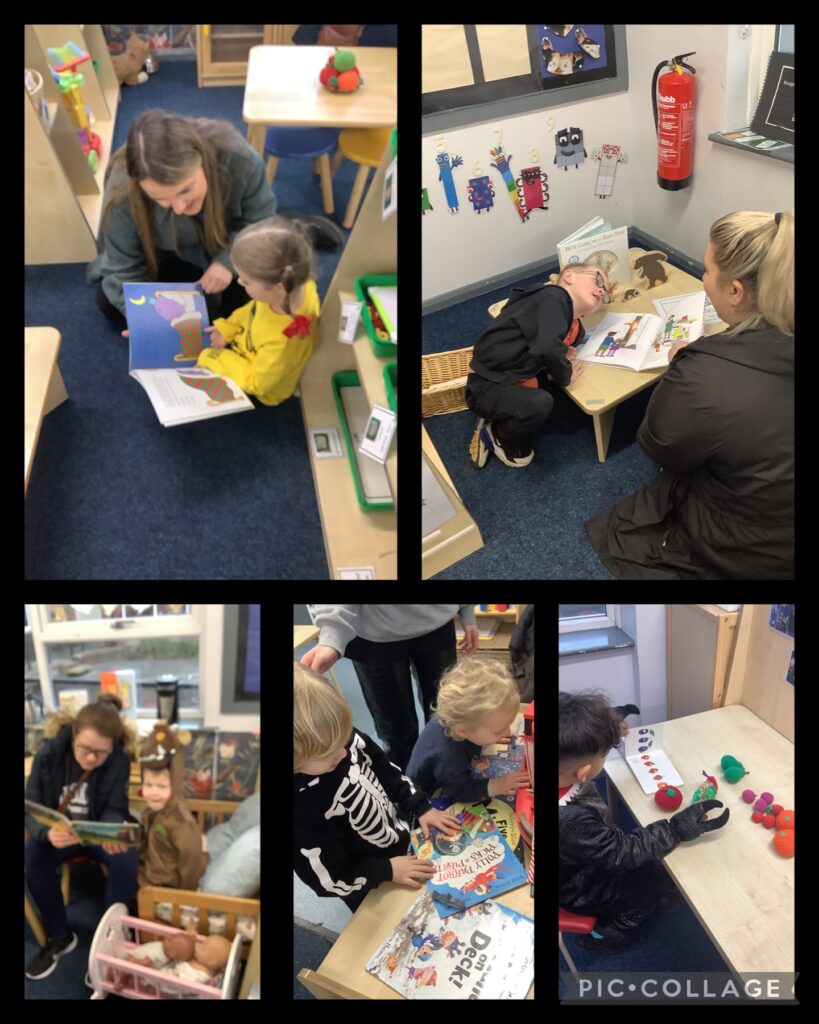
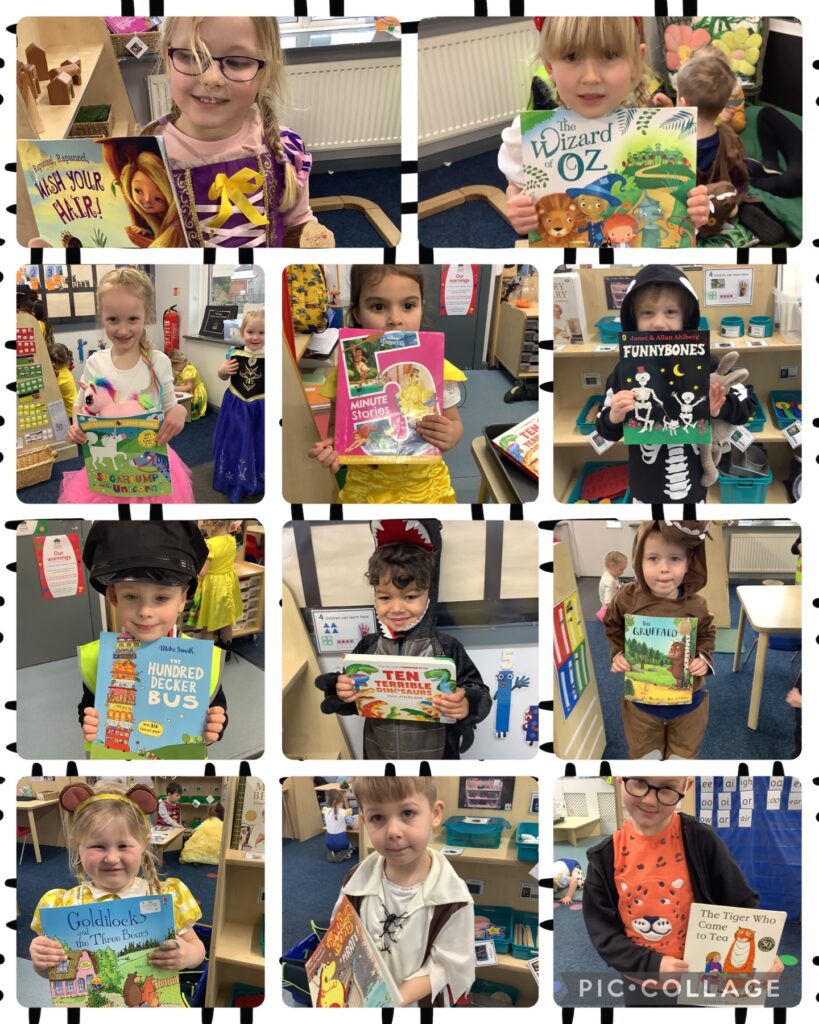
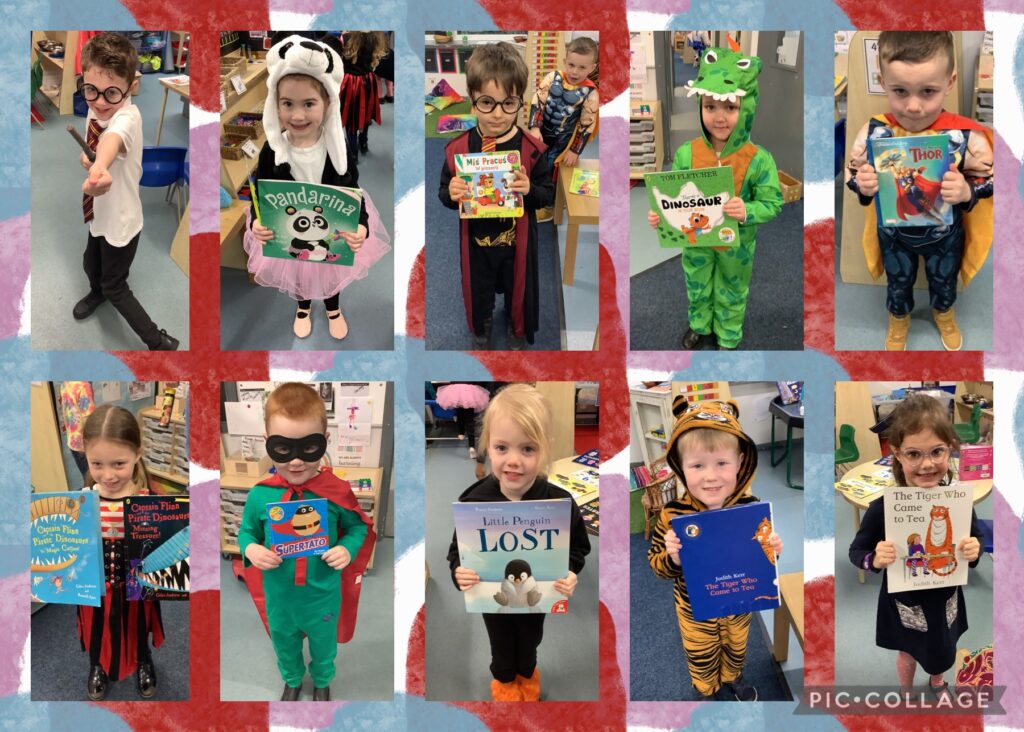
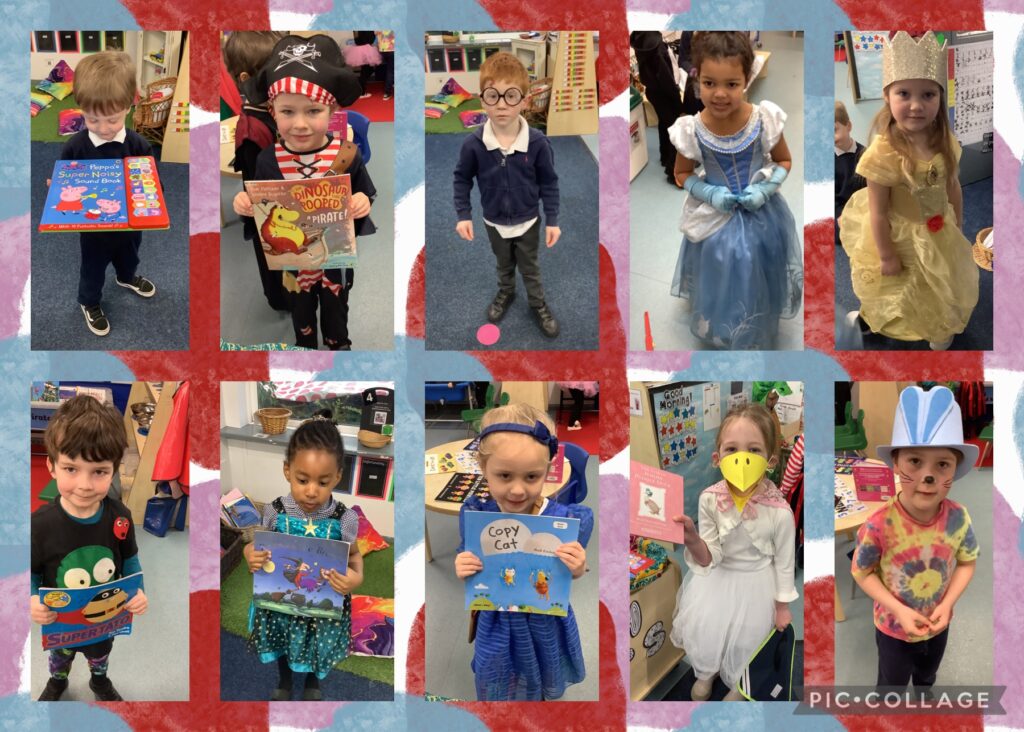
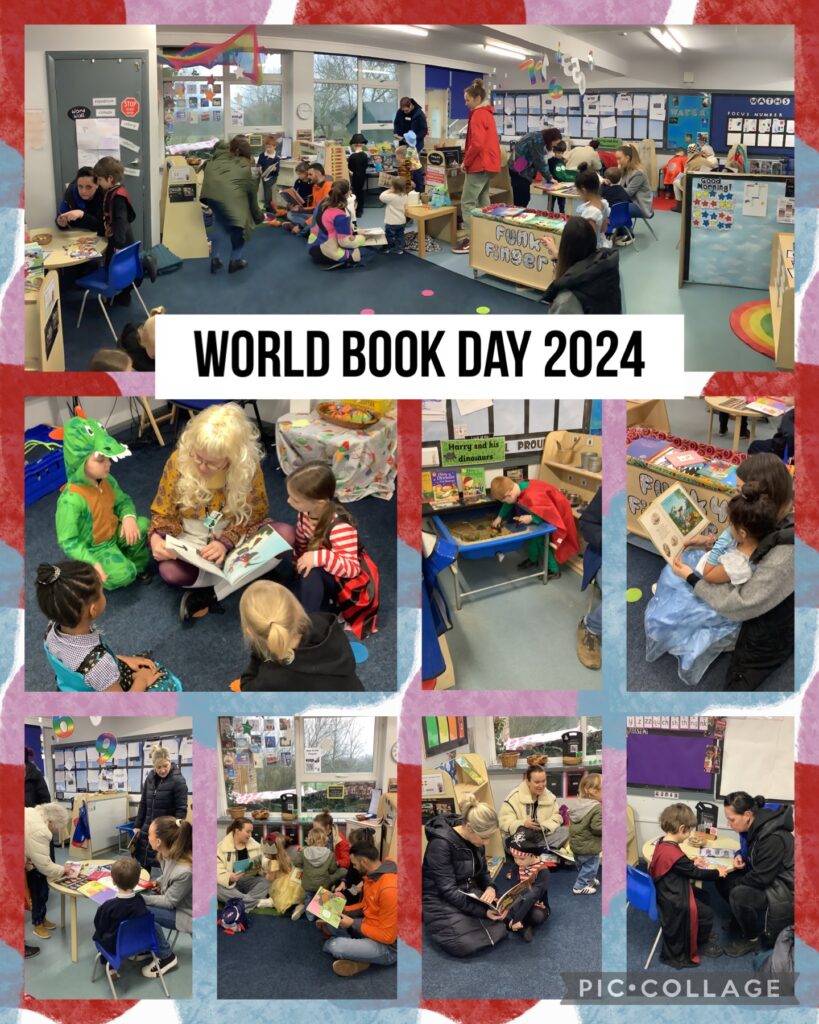
Hundred Decker Bus
A fantastic trip to the Railway Museum!
On Monday, the children had a fantastic time at the Railway museum. They were very excited to go on their first ever school trip – especially travelling there by coach! A few members of the public commented on how well-behaved the children were. Well done, Reception class!
The children enjoyed looking at different trains and making comparisons of old and new. They had lots of fun watching the miniature railway and it led to lots of great discussions about trains, tunnels and transport. The children enjoyed sitting on the Japanese Bullet train – they particularly liked the fact it goes very fast (150-200mph).
To end our fantastic trip, we sat in the upper gallery and viewed the trains across the museum. We then sketched the trains we had seen – the children drew some fantastic sketches!


The Hundred Decker Bus
This week, we’ve been reading another ‘Hundred Decker’ story by Mike Smith. The Hundred Decker Bus
In this story, a driver who is bored of his daily routine decides to take himself and his passengers on a long ‘adventure’. As more people get on the bus, more decks need to be built!
Linked to the story, we’ve been comparing cities/towns to the countryside, discussing similarities and differences. Countryside is our ‘word of the week’.

Top tip for watching YouTube with your child: go to the settings cog along the play bar and turn off autoplay – this avoids an inappropriate clip coming up automatically, and helps to discourage your child from passively watching clip after clip.
Computing
This week, we’ve been using Bee-bots. Bee-bots are an early coding resource. Children have to program the bee using directional and ‘GO’ buttons. They have to pre-plan the algorithm they need to enter, to successfully get the bee to its intended location.


Maths
In Maths, we’ve been comparing numbers and noticing whether change creates a number that is more or less than another.
In provision, we used the ‘bus stop’ number story to explore subtraction (creating less) and recorded our number stories.
Phonics
Spring 2 week 3 has been a review of phase 3 sounds, reading words with two or more digraphs (2 letters that make 1 sound). We review tricky words (a word you can’t sound out – you just have to know it) daily.
Tricky words can be just that-tricky! We’ve previously introduced a few fun games you can play at home to practice tricky words. Here’s another you could try…
Tricky word stick person (a modified version of the ‘hangman’ game)
We often play this game in class. Write the correct number of dashes for your chosen tricky word and let your child make guesses. Encourage your child to use letter names rather than sounds for spelling tricky words. Draw a part of the stick man for each incorrect guess- you can give extra chances by adding a hat, shoes, gloves etc. to the stick person!

Poetry Picnic
Each week we will be learning a new poem. We will recite this poem each day. By saying the poem out loud, we can focus on the sounds and rhythm of each word or line. We talk to the children about how this can help us become better readers. This week’s poem is the traditional nursery rhyme Pat-a-cake, Pat-a-cake.
We talk about how a poem sometimes has rhyming words and sometimes doesn’t. Can your child tell you the rhyming words in this week’s poem? We also talk about how a poem can have a fast rhythm or a slow rhythm.
Music
This week, the children have been listening to Gustav Holst – Mars. We switched off the lights, laid in the dark with our eyes closed and listened to the music. The children really enjoyed the time to stay still and reflect on the music they were listening to.
“It’s like a movie” Kitson.
“It’s like a storm” Sienna.
“When it was the end I was curling up because it sounded scary” Eli.
“It made me happy because of the little bits and loud bits together” Myla.
“The quiet bits made me tired” Liezah.
“I heard trumpets” Harry.
Reading reminder
Children should be reading fluently by the time their book is issued home on Thursday. Your child will have read their book at least 4 times at school – this is where the teaching of reading happens. The aim of reading sessions at home is to celebrate their reading. To showcase what they have learnt that week and for your child to recognise themselves as a ‘reader’.
If you believe your child is reading from memory you can ‘spot check’ particular words in a sentence or play games with the e-book (such as spotting tricky words).
Remember to encourage reading for pleasure through sharing library books, magazines and other texts at home.
Reminders and Dates
Reception’s Class Assembly- 14.03.23 2.45pm You are invited to our class assembly, where we’d love to share our learning with you.
 Top tip for watching YouTube with your child: go to the settings cog along the play bar and turn off auto play – this avoids an inappropriate clip coming up automatically, and helps to discourage your child from passively watching clip after clip.
Top tip for watching YouTube with your child: go to the settings cog along the play bar and turn off auto play – this avoids an inappropriate clip coming up automatically, and helps to discourage your child from passively watching clip after clip.